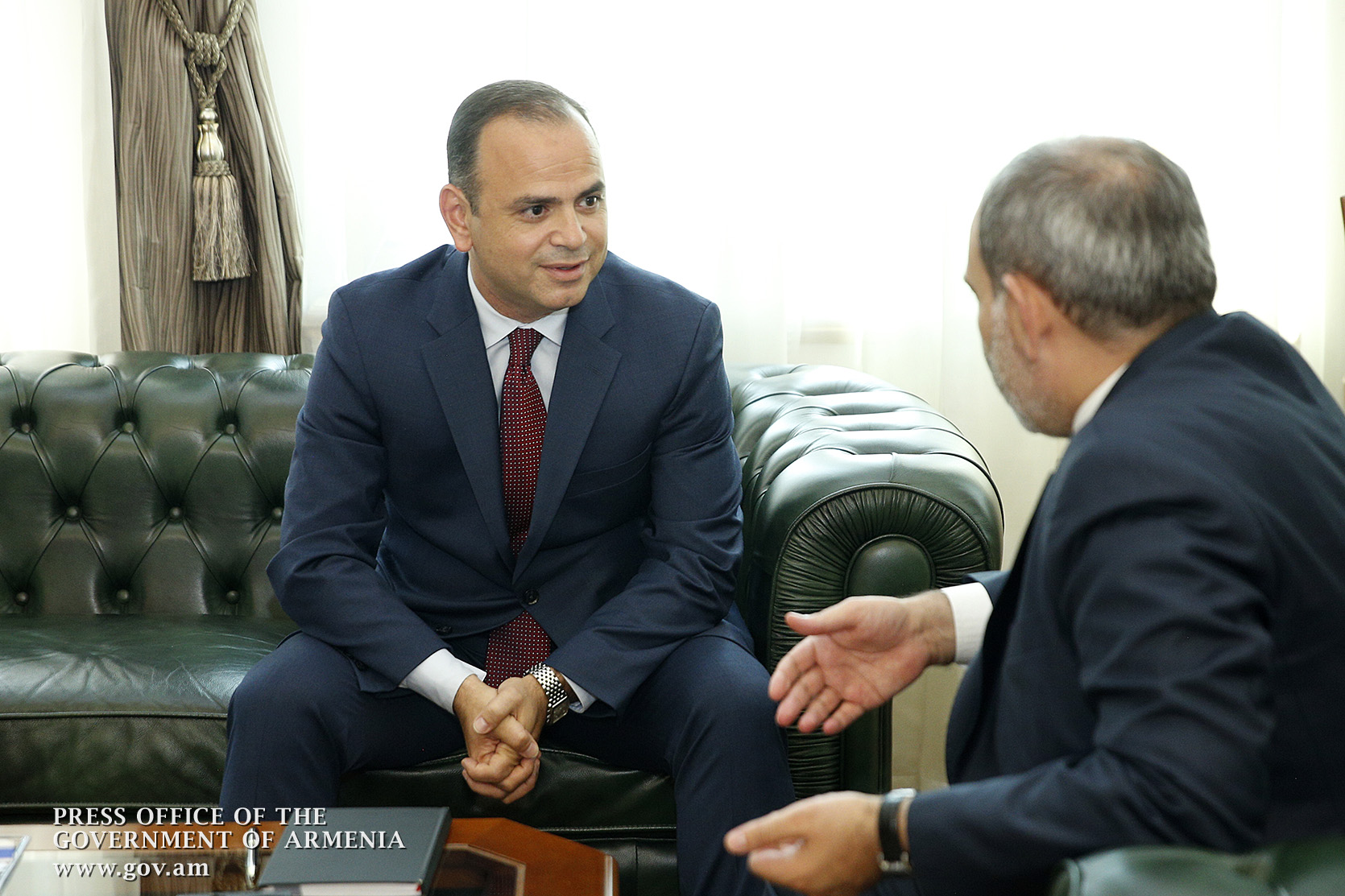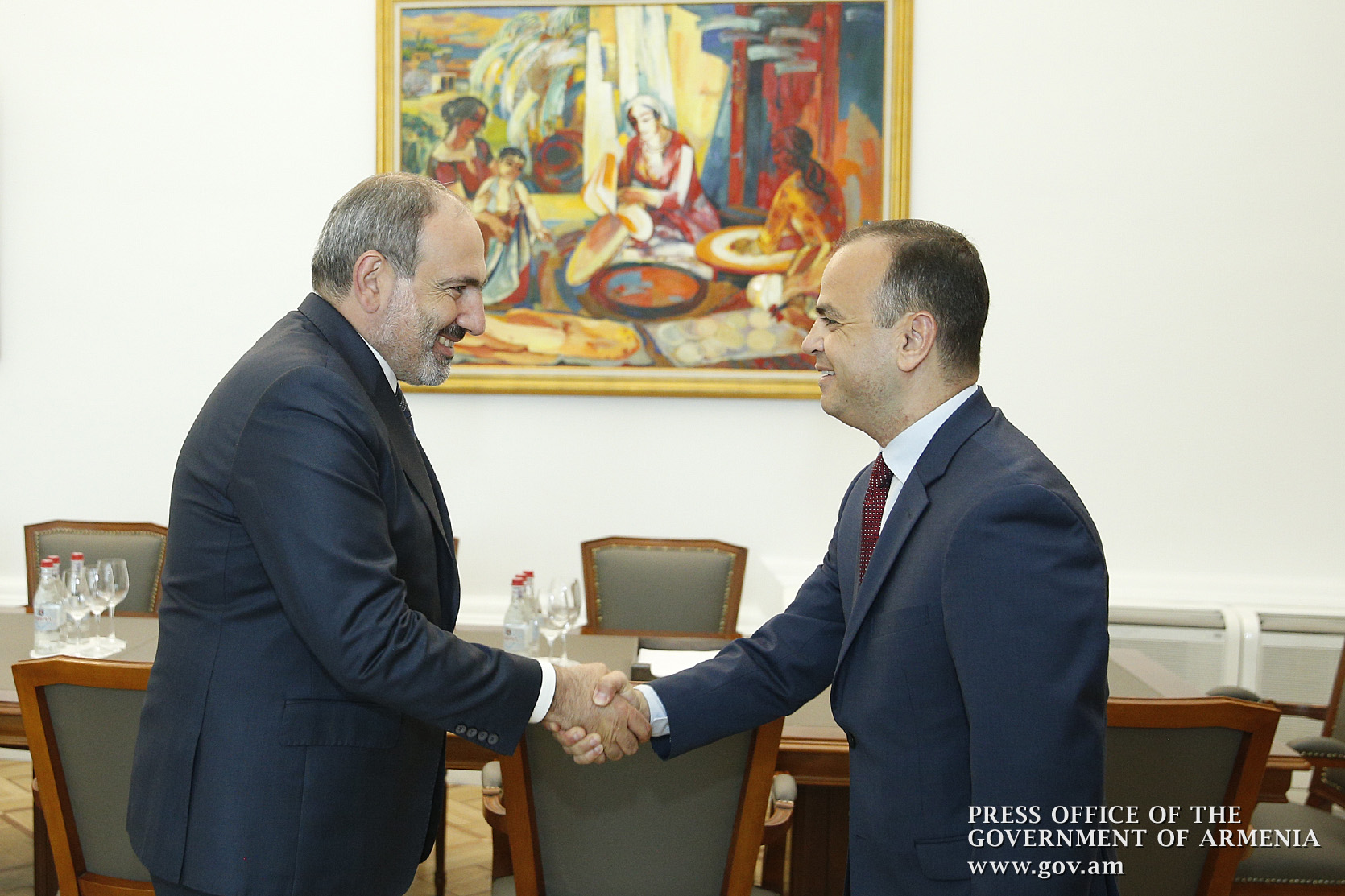
Zareh Sinanyan looks exhausted. “Sorry, I just got out of a day-long meeting marathon at the Prime Minister’s office,” he explains as he drops himself into a chair across from mine. I was Sinanyan’s last appointment on his first official day as High Commissioner of Diaspora Affairs.
Earlier this year, he completed his second term as mayor of Glendale, California. That’s when he got the news. “I had made my intentions clear to the Prime Minister back then,” he says, “so I knew I was being considered, but nothing had been made explicit.”
Sinanyan enthusiastically welcomed last year’s Velvet Revolution. “Activism is what got me into politics in the first place,” he reminds me. In the following months, he would make a series of visits to the Armenian capital, both in his official capacity as mayor of Glendale and as a private individual. During a chance meeting in Yerevan last June, he told me he was meeting with the new Prime Minister to explore opportunities for further cooperation with the Diaspora.
Pashinyan, it seems, had been listening. At a press briefing in his office last week, the Prime Minister turned to the outgoing mayor saying, “You are not an unknown figure in Armenia and the Diaspora, and I’m confident that we will accomplish our new tasks set in this new era for our people.”
In retrospect, the USC-educated lawyer is probably one of the most qualified candidates for the job. He bridges the gap between Armenia and the Diaspora like few others. Having left Soviet Armenia for southern California back in 1988, Sinanyan mastered English and even picked up some Spanish. Added to his native Armenian and perfect command of the Russian language, his message would resonate just as well in Moscow as well as Buenos Aires. He also holds sound managerial credentials. As mayor of the city with the highest concentration of Armenians outside of Armenia proper, he oversaw Glendale’s transformation into a tech and service-based economy. Despite his vocal criticisms of the previous regime, he continued to foster economic and cultural ties between his municipality and Armenia.
Sinanyan does not expect that his US citizenship could become a liability. Some critics have pointed out that, as a US citizen, the newly-appointed Commissioner General for the Diaspora might be cut off from two of the Diaspora’s most influential communities in Iran and Russia. Sinanyan literally brushes off those concerns with a physical hand gesture. “I grew up in the Soviet Union,” he exclaims. “I speak fluent Russian and have a deep understanding of Russian culture.” As a representative of the Armenian government, he can’t imagine how his citizenship would be of any consequence.
In any case, this Californian repat is the first person to ever hold the office of Commissioner General for Diaspora Affairs, which was brought into existence by an act of Parliament a month ago. Unlike its predecessor—the Ministry of Diaspora—this office will not be a cabinet position. Instead, Sinanyan explains, he will report directly to the Prime Minister’s office.
The former California mayor defends the controversial decision to close the Ministry of Diaspora, which, in his view, had left a bad taste in the mouths of many of his compatriots around the world. “If anything,” he says, “my biggest challenge as Commissioner General is to rebuild the relationship of trust with the Diaspora after so many years of neglect.”
That task won’t be easy on a shoestring budget. “In Glendale, I was mayor for 220 thousand people (including 100 thousand Armenians) with a budget of nearly one billion dollars at my disposal. Now, I’m managing relations of seven million Armenians with roughly one tenth of that budget!” he jokes. Judging by the expression on his face though, I’m not sure. “We’ll make it work,” he reassures me.
The incoming Commissioner General has a lot of ideas. But right now, the first priority is cutting red tape. Armenia’s wealthy diaspora should see their homeland as a smart investment opportunity, not just a charity case. His role would allow him to advise the Armenian government on how to better accommodate the needs of his global compatriots. At the same time, his office could provide support for Diasporan Armenians looking to engage with their homeland.
Sinanyan wants Armenia to become more than just a spiritual center for the far-flung Diaspora. It needs to serve as a cultural, economic and political haven as well.”There is no single Diaspora,” he says with a tone suggesting that he’s speaking from experience. “There are several spread across the world, each different from the other. They are united by a shared experience of being Armenians living outside their homeland.” He plans to work with individual diaspora groups to develop policies which will benefit both the homeland and the Diaspora.
When I bring up the topic of repatriation, his eyes brighten. “Absolutely,” he nods. While his predecessors may have been satisfied with the Diaspora’s money and not its ideas, Sinanyan thinks repatriates will be crucial in building up Armenian statehood. Before mass repatriation becomes a reality, however, the foundation must be strong. His team has started exploring ways to strengthen ties through language lessons, summer camps, art exhibitions, culture promotion, educational programs, academic cooperation and professional work exchanges.
The first step is to encourage a calculated ‘brain-gain.’ Sinanyan’s strategy is to place experienced people from the Diaspora by importing management positions across the Armenian public and private sectors. If Armenia is to become home to all Armenians, it may as well take full advantage of the wealth of knowledge and experience Diaspora puts at its disposal. “We’re currently expanding a list of names in our database of diaspora professionals,” he tells me. This list existed before, but only managed to accumulate around twenty-thousand names in the last decade.
His first day in office now over, Sinanyan is beginning to grasp the magnitude of his task. As the man chosen to reconcile Armenia with its Diaspora, he must mend a rift founded on genocide, Bolshevism and exile. A monumental undertaking for any man, perhaps, but the former mayor of Glendale insists there’s no place he’d rather be.
Motioning towards the elevator, he pauses for a moment. Suddenly he doesn’t look all that tired anymore – “I knew I was going to return as far back as 1991.”

Editor’s note 06/20/2019: The article was amended with more accurate figures for the City of Glendale budget and population


Can they please teach the civil service workers to be a bit more sensitive about theWestern Armenian language,
When I have a birth certificate where my name is spelled Գէոֆգ Գալայճեն they don’t need to translate my name as Կէվորկ Կալաջյան simply because my American passport spells my name as Kevork Kalayjian.
Since 2015 I am trying to correct my name and spent over $2,000 in legal fees in Armenia, and I don’t have a court date yet!
And then they say come to Armenia!???
Lol 2000$ for their mistake that’s crazy… but what is the translation for and why do you need it so badly? Why not just show them your birth ceritficate? Is it really misspelled as Գէոֆգ Գալայճեն or is it just a typo on your part?
Glendale is a microcosm of diaspora. He probably hasn’t been in many traditional diaspora communities but as mayor of Glendale he has undoubtedly worked with Armenians from all over the world. Probably the best candidate for this position. Someone who knows Both Armenia and diaspora.
What’s the difference?
And the first decision of Glendale mayor was to appoint Sara Anjargolian, hysterically anti Russian, who became famous for proudly posing near a “f*ck Putin” banner, as chief of staff.
Excellent message sent to the diaspora in Russia, first investor (and by far) in the Armenian economy.
zareh is bad news for Armenia!
So disappointed with this appointment. What is his accomplishment as a Mayor? he left the city the worse that he found it.
“transformation into a tech and service-based economy” really? I can tell the reporter does not live in Glendale.
His election was full of controversy and if it was not for ANCA push, he would not have been elected.
There has been an established and respected principle that no person with an emphasized partisan leaning be appointed to an Armenian governmental position which deals directly with the Diaspora. This principle has existed so as to respect the peculiarities and sensitivities within the Diaspora’s various communities and to prevent any hindrance towards the strengthening of ties with the Homeland.
This fundamental principle has unfortunately failed to be taken into account by the appointment of Zareh Sinanyan as the Chief Commissioner for the Diaspora Affairs. Sinanyan has been politically active, within the Armenian community of Los Angeles, exclusively through structures affiliated with Dashnaktsutyun and throughout the years, has made public statements which were highly irresponsible, slanderous and hypocritical, to say the least.
Participating in the local electoral processes, he has shown a very aggressive attitude towards his political opponents, especially to our organization, making false accusations, for the mere reason that we did not support his preferred candidate.
During his tenure at the Glendale City Hall, Mr. Sinanyan was incapable of showing broad-mindedness and tolerance, and used his office as a tool to discriminate and create divisions in the Diasporan community.
Zareh Sinanyan is free to have his own political views, but his divisive actions in the past cannot be neglected nor forgotten, and this certainly will have a negative impact on his current position.
Zareh Sinanyan does not meet the necessary requirement of being at equal distance with all the Diaspora structures. Therefore, we have strong reservations on his appointment.
Social Democrat Hunchakian Party:
Western United States, Executive Committee
June 18, 2019
Los Angeles, CA
United States
“There has been an established and respected principle that no person with an emphasized partisan leaning be appointed to an Armenian governmental position which deals directly with the Diaspora. ” —-> Hmmm, so how can we explain the decade-long appointment of hardcore Bolshevik and Serzh Sargsyan loyalist Hranush Hakobyan as Diaspora Minister?
The policy of present Armenian defense army statues must be changed, accept the power of diasporan Armenian volunteer soldiers, who are willing to serve in Armenian armed forces without the help of “mother Russia”! Armenia will become an independent powerhouse of South Caucasus!
Diaspora Armenians already can (and do) volunteer for the Armenian military, so I’m not sure what needs to be changed.